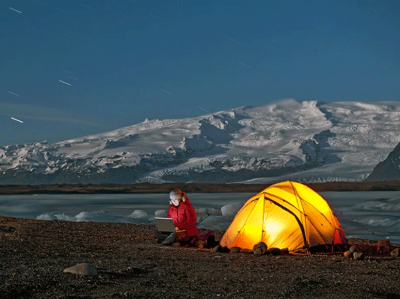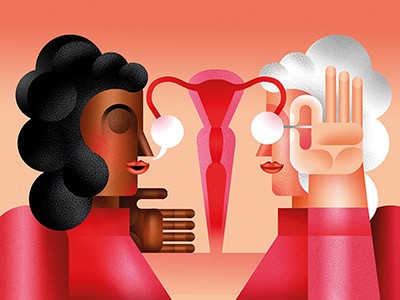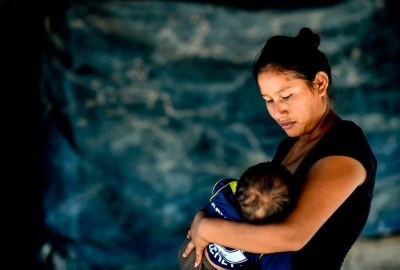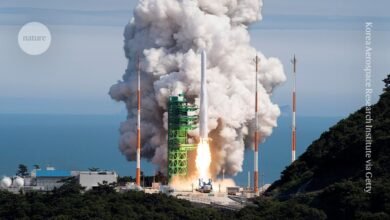
Menstruation is something that close to half of the world’s population experiences at some point in their lives. That experience varies widely from person to person, from month to month, and across the years, making period management tricky, no matter what the circumstances. And difficulties multiply when symptoms such as migraines, period cramps or heavy blood flow crop up in remote regions that might not have bathrooms or running water, and where you might not be surrounded by understanding colleagues.
Some fieldwork challenges are practical: Menstrual cup or tampons? Is there enough clean water for proper sanitation? How best to dispose of waste or take it with you?
Other challenges are tied to broader issues that are cultural or to do with academic hierarchies, such as the power dynamics between early-career researchers and older, often male, scientists, says Robyn Pickering, an isotope geochemist at the University of Cape Town in South Africa. “At South African universities, a young Black woman is never going to turn to her older, white lecturer and be like, ‘You know, could we stop at a pharmacy?’,” she says.
Some scientists are opening up conversations about menstruation to make fieldwork more inclusive for early-career researchers. They talked to Nature about their approaches, and how trip leaders can help others to feel more comfortable at any time of the month.
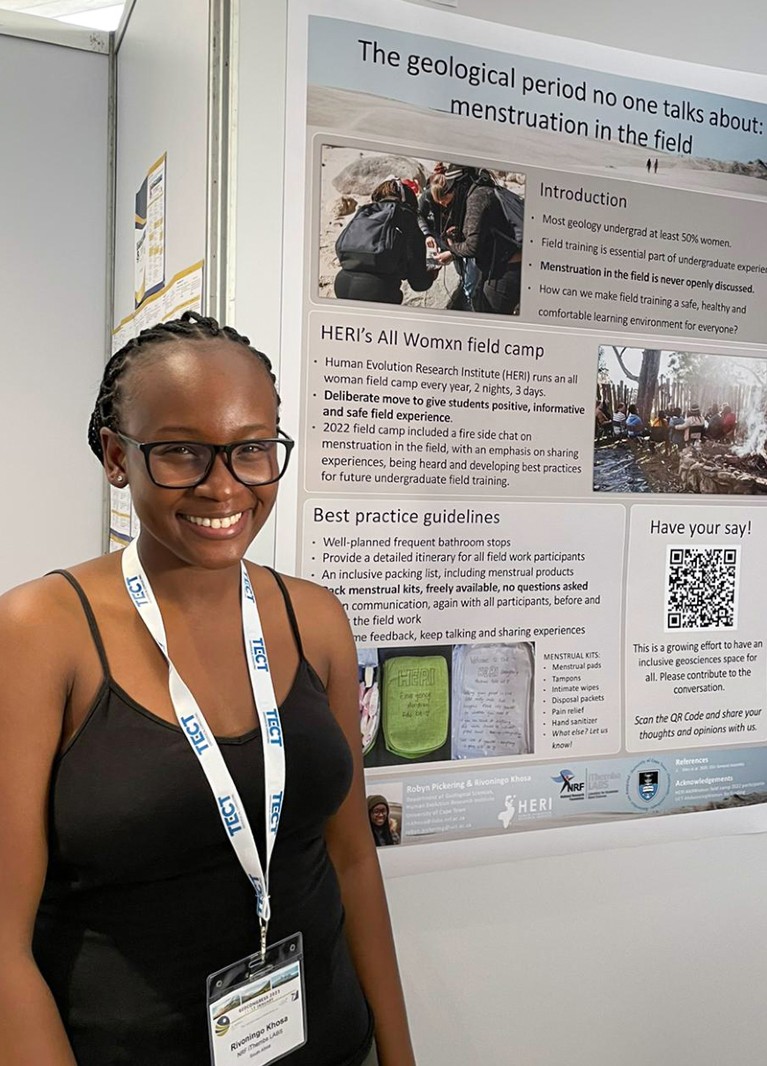
Rivoningo Khosa presented a poster about menstruation and fieldwork.Credit: Rivoningo Khosa
RIVONINGO KHOSA: Have the menstruation conversation out loud
PhD candidate in geological sciences at the University of Cape Town in South Africa.
When I was an undergraduate student at the University of Johannesburg, South Africa, the subject was all secret, all completely hidden. During my final honours year, we were going on a field excursion to Inhaca Island off the coast of Mozambique for ten days — with no running water, no bathroom, just beach. Standing in a queue at the university clinic to get vaccine shots before the trip, one girl said, “Oh, I need to get my pills to stop my period.” And nobody responded. Nobody said anything!
And because nobody spoke about it, I had the traumatic experience of having to bury a tampon. There was no advice such as, “Oh, you can use a little bag, tie it up.” I still think about it.
It was only in 2022 that Robyn Pickering, my PhD supervisor, and I started talking about menstruation and field trips. We were going to be co-leading the three-day All Womxn Field Camp for third-year and graduate students in archaeology, geology and anthropology, as part of an initiative to address barriers to entry to these disciplines.
We really tried to create a safe space in which everyone knew each other by name, not by title or how much experience they had of fieldwork. One night, once everyone was relaxed around the campfire, we started the conversation about menstruation. It seemed as if everyone had a story. People felt they couldn’t say anything when in the field — the show had to go on, even if they were not feeling well. They couldn’t explain why they needed a bath or to clean up.
That night, we started brainstorming about how to make geology field trips better. One idea was that every departmental field trip should offer a menstrual kit. Robyn and I made up kits containing tampons, pads, sanitizer and disposal bags. The kits also included a little note that said that this happens to all of us. We even developed a script for trip leaders to read as part of the pre-trip briefing, so that everyone knew that the kits were available.
Some of the men leading the trips just cringed. For them, it’s still a taboo thing, as in, why must we even talk about this? They often don’t understand that it’s not that someone didn’t know their period was coming, but these things can be hormonal, and situational — one week, you were a bit stressed, and it was a bit delayed, or you did a bit more walking the previous day, and now it has come a day early.
We also took this issue to conferences. We had a poster, titled ‘The geological period no one talks about: menstruation in the field’. When I presented it at GeoCongress 2023, in Stellenbosch, South Africa, several men came up to tell me I shouldn’t say things like that in public. But one older white man appreciated it. He was the father of two young girls and respected the fact that someone was initiating a conversation. Then there were the walk-ups — they read the title, squinted, made a face and went away. I found the non-verbal reactions quite entertaining.
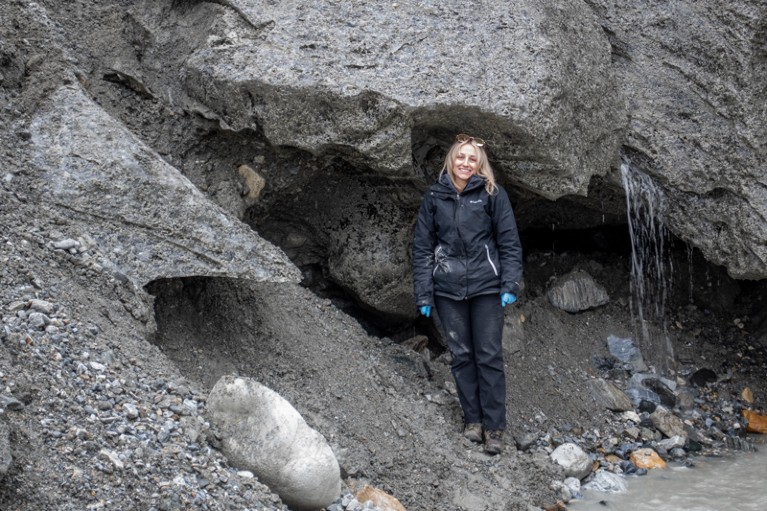
Geographer Becky McCerery co-wrote a guide on period management for remote fieldwork.Credit: Rebecca McCerery
BECKY MCCERERY: Make fieldwork accessible for everyone
Physical geography postdoctoral fellow at Northumbria University in Newcastle upon Tyne, UK.
My last experience of having a proper period in the field was in Alberta, Canada. I needed to take an over-the-counter painkiller. We’d be out all day collecting sediments, and I had to take the painkiller with food, so had to structure my meals to get a nice constant dose of pain relief. I’m an avid menstrual cup user, and there, I had a shower at the end of every day and could clean the cup. The field trip lasted only two weeks, so I didn’t have to sterilize the cup to use again. But the site was remote enough for this to be enough of an annoyance that I decided I wasn’t going to do that again.
The next time I went into the field, which was ship-based research in Norway’s Svalbard archipelago for my postdoc, I got a prescription for norethisterone, which is a synthetic form of the hormone progesterone. You can take it for up to 21 days to delay your period—although it doesn’t work for everyone. I took it before setting off, so that I would be doing my fieldwork during the nice part of my cycle, when I had lots of energy. Once you stop taking it, you still feel shit — but I prefer to experience that at home rather than in the field. I used norethisterone in Greenland, too, when I was working in temperatures down to −26 °C.
On the Svalbard trip, I met Bethan Davies, a glaciologist based at Newcastle University, UK. We were both seasick and went up to sit on the bridge. We started talking about ‘wild wees’ — urinating when out in the wilderness — which led to talking about periods. Before the trip, there had been a meeting with a field guide and, particularly because of the polar bear risk, they gave information on what to do if you need to go to the toilet, if you have to use toilet paper, if you have to poop. It was a really nice way of not making assumptions about anyone’s experience level — an absolutely back-to-the-basics overview.
Breaking the menstruation taboo to make fieldwork more inclusive
Bethan wanted to write something about wild wees and menstruation in the field, and she was looking for help. I’m super into managing my period; I love to try all the new products — period underwear, menstrual cups, menstrual discs — anything that’s going to make the experience more comfortable. We wrote up notes on the ship, and then wrote a post about all the various options for a website that Bethan runs, called antarcticglaciers.org. It’s not something you should have to learn about on the fly.
I have a predictable, uncomplicated cycle and I don’t have any concerns that prevent me taking these medications. So, my experiences are coming from a place of privilege. That’s not the case for everybody. We’d love to hear from people who face different situations so that we can include their experiences and tips.
Menstruation should be incorporated into a pre-trip risk assessment, because it is a health consideration, and one that should be normalized to reflect that people who menstruate are working in the field. If you’re going to be using pads or tampons, you need a place to change them. Not being able to change your tampon or clean reusable products properly can be a massive health risk, especially in a remote location.
I’d like to stay in academia in future, and be the one leading fieldwork. I want to make sure that fieldwork is accessible and a positive experience for everyone.
SAMPURNA DAS: Don’t feel guilty about taking care of yourself
PhD candidate in sociology at the University of Delhi in India.
My research is about how people live on shifting river islands in the Brahmaputra River in northeastern India. With ethnography, which is a research method used to understand groups and communities through long-term immersion, you want to stay in the field for an entire agricultural year, documenting what you observe and what you participate in. It takes a lot of energy — both physical and mental — to be in the field, talking to people and maintaining a rapport.
My field site and my home are in the state of Assam. It’s a place where menstruation is celebrated. I am Hindu and there is a particular deity, called Kamakhya, that is celebrated in relation to menstruation and procreation. But, in that region, there are also cultural do’s and don’ts around menstruation. For example, some women would not step out of the home during their period, or would maintain a certain distance from men. So, from the beginning, people expressed concerns about me being in the field while menstruating. They assumed that because I was from a particular community, I would be following these rules.
Why menopause matters in the academic workplace
During the initial months of my fieldwork, I thought it best to leave my field site and be by myself during menstruation. But there was a sense of guilt: in the back of the mind, I was thinking, “A good ethnographer stays in the field for the entire duration. What am I doing taking a week-long break every month? Did I miss some important conversation or observation?”
Finally, I decided to talk to my supervisor. She said, you need to listen to your body and give up this idea that fieldwork can only be done in the field. Instead, she suggested, during that time, I could be reviewing notes, reflecting or making plans. Fieldwork is challenging and I could also use that week to recuperate, she said — and I shouldn’t feel guilty, because that doesn’t help anyone.
Eventually, I decided to remain in the field during my menstrual cycle. Leaving meant I was stepping out of the conversation about how women living on these islands deal with menstruation. Staying opened up a different set of conversations and developed my rapport with the women. I am moving towards a new approach: I can listen to my body as an ethnographer, and take breaks if I need to, and also bring my body and what it’s experiencing to my fieldwork.
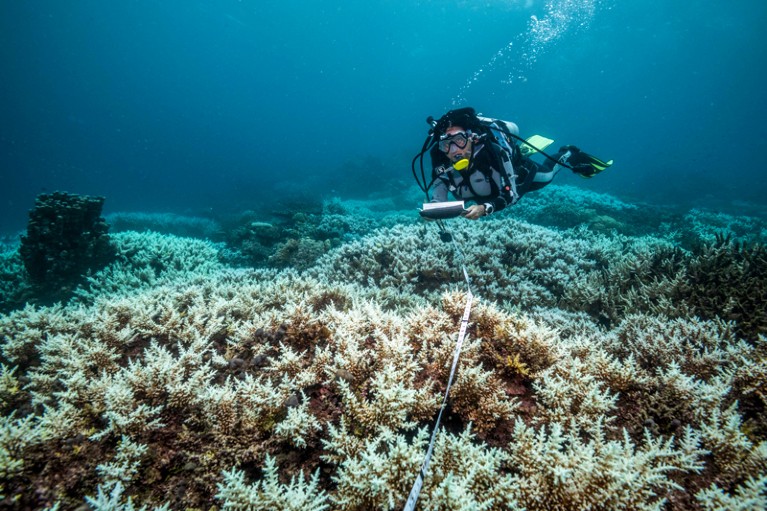
When leading dive teams, Sangeeta Mangubhai helps female divers to plan around periods.Credit: Tom Vierus
SANGEETA MANGUBHAI: Attitudes towards periods have real consequences
Coral reef ecologist and a principal consultant and research scientist at Talanoa Consulting in Suva, Fiji.
I grew up in Fiji with the ocean as my playground. In recent years, I’ve conducted interviews about gender and fisheries here in the South Pacific, which exposed challenges for women in fisheries research. There’s this institutional thinking that women are not suited to particular jobs because they menstruate. It is used as a reason to discourage women from working in fisheries research, especially if diving is involved. It has real consequences. Some women avoid fisheries research because those viewpoints persist.
Unfortunately, some South Pacific island cultures have a lot of stigmas around menstruation. I think people in leadership positions need to be putting out information that reinforces more-positive messages. Half of the planet goes through it, so we don’t need to be afraid of it. Institutions need to be committed to recognizing that men and women have very different needs.
Children on fieldwork: how two scientist mothers made it happen
Some situations are a little more complex, such as those that arise on an open boat, and it’s challenging for people in my part of the world to mention the subject. Because I’ve travelled, worked abroad and been in senior positions, I just say, “Sorry guys, got girl issues. All of you need to go to the other side of the boat and look away.” It is much harder for other staff, particularly if they’re from those same cultures, to say that to the men.
When I have a team that includes female divers, we plan around the women’s schedules if we need to. If someone is having a heavy period, we can say, “In the first few days, we will do the sites closest to the village. We’ll come back and change tanks, and people can go to the bathroom if they want.” It’s easier to do this with a female leader who can talk to the female divers and find out what it would take to make them comfortable.
These days, I find that young women who decide to pursue marine-science degrees are quite comfortable using the products they need to be able to dive. Having peers and talking to them about how you deal with periods normalizes things. At one point I had a really strong team of female divers, and nothing was going to stop them.
Source link
